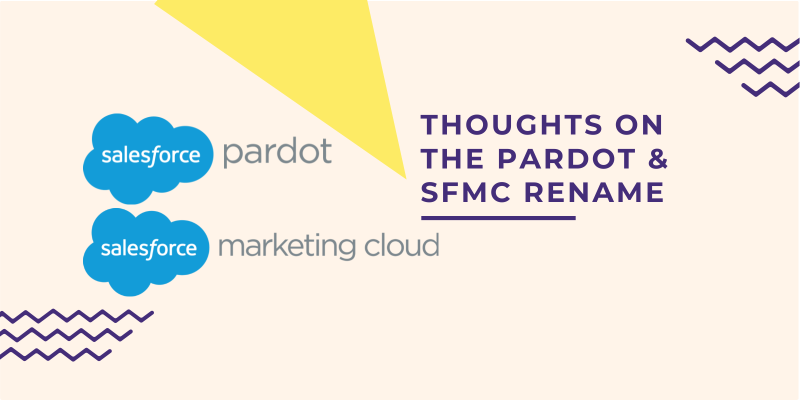On 10th April, at Salesforce World Tour Sydney, Salesforce announced a rename of its Marketing Cloud and Pardot products.
I debated about whether to write about this at all, as my overall view is not positive. In summary, I’m not being critical here to be ’edgy’ or throw mud. It’s just worth adding some extra unfiltered thoughts to the dialogue around the name change.
Here’s a summary of the rebranding:
| Old Name | New Name |
|---|---|
| Marketing Cloud’s Messaging and Journeys | Marketing Cloud Engagement |
| Pardot | Marketing Cloud Account Engagement |
| Interaction Studio | Marketing Cloud Personalisation |
| Datorama | Marketing Cloud Intelligence |
| Advertising Studio | Marketing Cloud Advertising |
| Salesforce CDP | Marketing Cloud Customer Data Platform |
Being a Pardot community member who has been working with the platform for over half of my working career, I regularly discuss with new clients around their journey in selecting Pardot, their perception of the positioning and branding of the product. Based on this, I’ve summarised a few categories below where I think there might be issues with the name change.
Products vs suite of products
I’ve always seen potential for confusion between Marketing Cloud as a product itself, and as a suite of products. There’s definitely an attempt here to make that distinction a little clearer, making Marketing Cloud the suite, and then giving clearer names to the sub-products, but part of what makes it fall short is that whilst the name of the suite has been strengthened, the names of the individual products are much more generic and are no longer actual brands.
Can you imagine the challenges Salesforce support are going to have with people getting in touch, and instead of having problems with “Datorama” or “Advertising Studio”, they now have problems with “Intelligence” or “Advertising”, or having to prefix absolutely everything with “Marketing Cloud” because it’s terribly unclear otherwise?
Product naming: branding vs functionality naming
The headline from Salesforce is that the naming changes are to make the products ‘Easy’ to understand. I’d wholeheartedly disagree. There is no way that an average buyer will find it “easier” to understand the differences between “Marketing Cloud Engagement” and “Marketing Cloud Account Engagement”. Having distinctly different brand names for its products historically has helped Salesforce in positioning Marketing Cloud and Pardot as very different beasts.
But that’s not all. Just about every decision maker who has purchased Pardot, has made the same couple of Google searches, whether that’s “Pardot v Hubspot”, or “Pardot v Marketo v Eloqua”. I know I did back in 2014 when I was selecting Pardot for an end user, and I know buyers today will do the same thing. However, as you’d expect, there’s not 10+ years of this content available for “Marketing Cloud Account Engagement”, or even worse, the average buyer will now find a “Marketing Cloud v Marketo” blog post, which is an entirely reasonable thing to think is relevant, but is completely misleading.
Pardot as part of the Marketing Cloud suite
Pardot being counted as being under the Marketing Cloud suite is simultaneously controversial, and in fact nothing new. If you’ve trawled the Salesforce website for as long as I can remember, Pardot’s technically been a subpage of Marketing Cloud. Pardot also uses Exacttarget (Marketing Cloud) email servers to send emails. But that’s really where the links end. In reality, they’re entirely different products, on different technology stacks, with different target markets, and different ways and levels of integrating with Salesforce.
Salesforce maintains that “Pardot has always been in the Marketing Cloud”, but from my point of view as an admittedly biased Pardot Consultant, it’s never felt that way to me, or my clients, and keeping them positioned as very distinct products has historically been both logical and very simple to do.
Pardot as an “Account” Engagement platform
Fundamentally I don’t object to name changes - if they make sense. However my single biggest concern is that Pardot’s new name just doesn’t feel right at all. The use of the word “Account” in “Marketing Cloud Account Engagement”, is rather strange on a few different levels:
- Firstly, the name makes me think of Account Based Marketing (ABM). Pardot doesn’t really have any specific ABM capabilities. If that’s coming on the roadmap, fine, but it’d be much better to communicate that this is the reason why they’ve selected the name
- Salesforce’s own value proposition around Pardot emphasises its strong Lead Management and Lead Qualification capabilities. Bringing this into the naming convention would have been much, much more logical.
- Typically clients using Pardot and Marketing Cloud together in a dual-MAP architecture use Pardot for Leads and Marketing Cloud for Account communications. Salesforce’s own materials also align with this. The new naming also confuses that.
Community Impact
Others in the community have spent years positioning themselves, their consultancy, their community events, around being front of mind when it comes to Pardot - to mention a few, the Pardot London User Group (and all the other non-UK Pardot communities), the Pardreamin’ event, and The DRIP Blog, which is arguably a more valuable Pardot resource than Salesforce’s own knowledgebase. I can’t help but think that these folks have had the rug pulled from underneath them, without a really strong reason to do so.
Selfishly, my last concern is around personal branding as a Pardot Consultant. I have my doubts around the level of understanding that recruiters and end users have around the renaming, and from their perspective, I’m no longer a well-certified Pardot Consultant with years of experience, but instead, I’m a poor “Marketing Cloud” consultant. My prediction is that there’ll be a wave of Pardot Consultants trying to quickly upskill in Marketing Cloud Engagement, to become more rounded “Marketing Cloud” Consultants.
